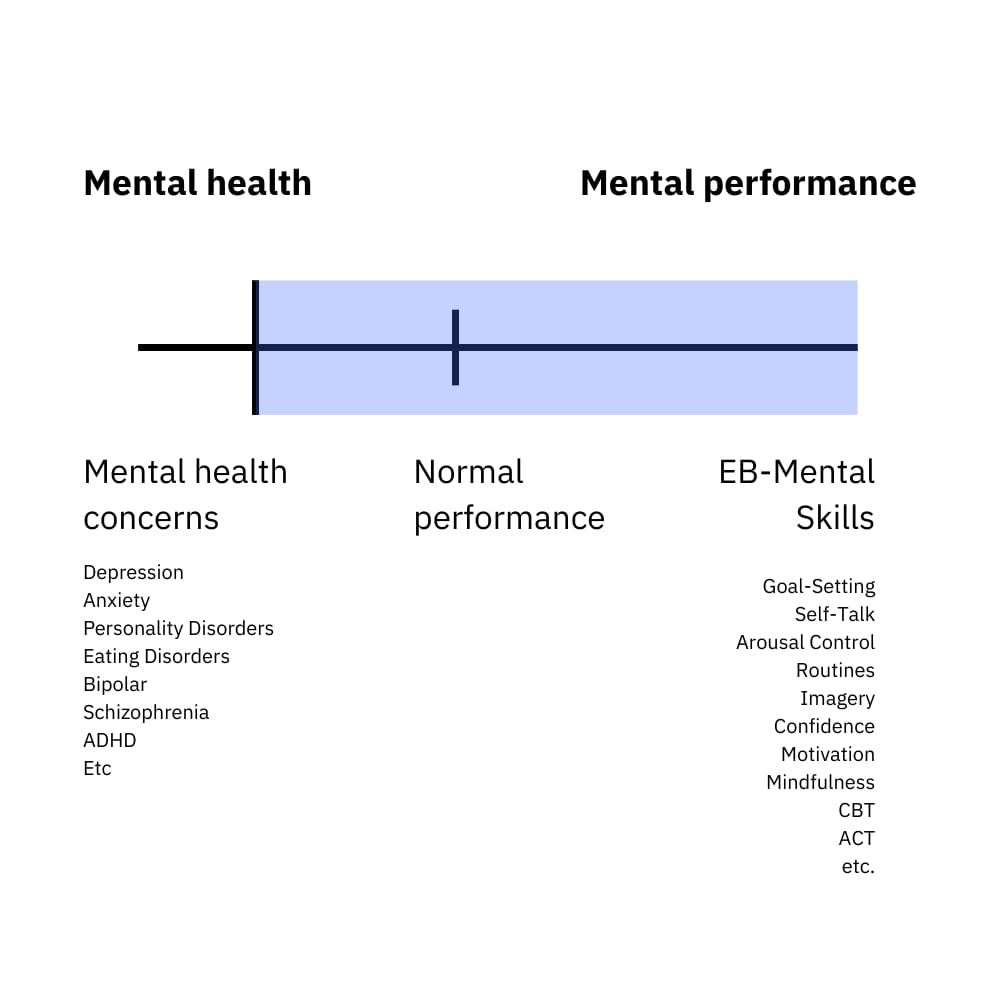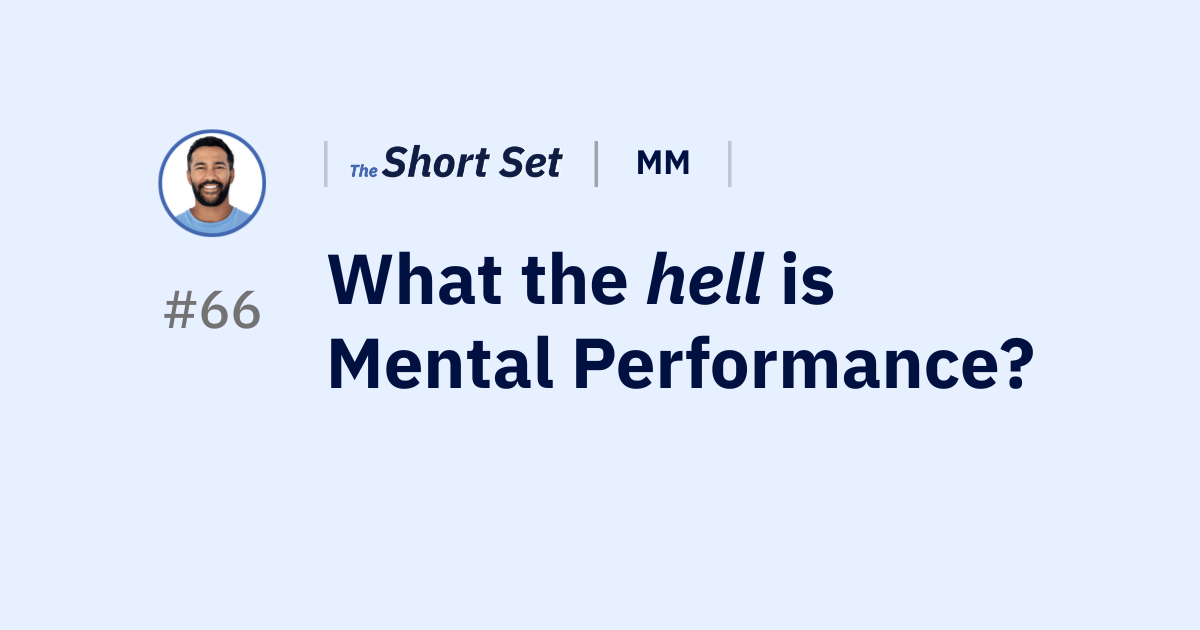
I did a poll on instagram asking, “What would you search for if you wanted help on the mental side of your game?” and the results frankly didn’t really surprise me.

This is because the mental performance field has generally done a really poor job at communicating what it is, what it does, and how it can help athletes and performers improve their level of play when it matters most—in tournaments, matches, big events etc.—through the application of evidence-based research areas. Most people understand it as “sport psychology” but this isn’t really accurate. In fact, this is what I thought this field was when I needed help a long time ago.
This lack of awareness of and understanding of the legitimacy of this field, subsequently, has led to an entire cottage industry of… charlatans, pretenders, and inadequately trained individuals who present themselves as “mental coaches” or even “sport psychologists.” But that’s a topic for another day.
Today, I’ll explain what the field of mental performance is, what it’s based on, and what you should look for when searching for professionals to work with.
So what is mental performance?
Dr. Jamie Shapiro, on the Speaking of Psychology Podcast, explains mental performance and mental health as existing along the same continuum. I think the description is apt and effective. On one side we have mental health and on the other we have mental performance.

Mental performance, first and foremost, is about performance enhancement. Sport and Performance Psychology professionals focus on helping athletes and performance handle problems like over-arousal, negative self-talk, attention control, choking, poor match performances etc. We can also help address confidence as a skill and help athletes and coaching staff create intrinsic motivation. Note that all these mentioned exist on the right-hand side of the mental health marker and considered performance.
Mental performance vs. mental health
Which leads us to this important, and often misunderstood clarification, which is that mental performance is non-clinical. What does that mean? Sport and Performance Psychology professionals are rarely dual-trained. Meaning that we are not psychologists. In fact, anyone who presents themselves as being a psychologist in the United States while working in the performance domain and does not have the appropriate clinical-training is either lying to you or is being incompetent in what they’re presenting their services as.
The requirements vary in different parts of the western world, but to legally call yourself a sport psychologist, you need to be dual-trained. This means that you not only will have undertaken training in a sport, exercise, and performance psychology program, but that you’ve also undertaken the required psychology training under supervision—and passed a licensing exam like the EPPP. Psychologists are trained to assist individuals with clinical problems like anxiety, depression, personality disorders, bipolar, schizophrenia, etc.
Obviously, I hope you can see how unethical it is for someone to present themselves as a “sport psychologist” when they are not trained in one or either both of these domains. This is why mental performance professionals often use terms like sport psychology consultant or mental performance consultant in describing themselves.
Evidence-based and built off several different research areas and domains
Now that we have an understanding of mental performance, you might be wondering what exactly mental performance professionals base their work on. Well, it’s definitely not just made up terms or ideas. I’m sure you know what I’m talking about—the kinds of coaches we see online who have their own special method. It’s not that. Rather, professionals build their consulting and inputs off the following academic fields and areas:
Sport Psychology
Counseling
Motor Behavior
Psychology
Sport Science
For example, the cardinal psychological skills that practitioners often teach and integrate—self-talk, imagery, pre-performance routines, goal setting, arousal control—are derived directly from Cognitive Behavioral Therapy. They are evidence-based, in the sense that we have decades of evidence that they are effective at helping athletes and performers. Skills like confidence (self-efficacy) and motivation, also have decades of evidence behind them through sport psychology research.
Even newer skills like mindfulness for sport are building up a solid evidence-base for their support. So when you work with an adequately educated, supervised, and credentialed professional, you should know that we are not just making shit up… rather, we are standing on shoulders of giants in fields of Sport Psychology, Counseling, Motor Behavior, Psychology, and Sport Science.
Educational and certification requirements—and what to look for when searching for help
Which leads us to the official educational route that practitioners take. mental performance professionals usually have or are enrolled in:
At least a master’s degree in Sport, Exercise, and Performance Psychology
Sometimes a PhD in Sport, Exercise, and Performance Psychology
As an additional note, having a PhD does not necessarily mean that someone is a “better” practitioner than a master’s level professional. This is because, in this field, a PhD only denotes that a person has added to the research literature in Sport Psychology.
This means that we often have individuals who lean toward research and teaching as opposed to private practice. Whereas master’s level practitioners hone their craft as practitioners, accruing many more client hours and interactions compared to PhD practitioners.
Other than educational requirements, the Association of Applied Sport Psychology (AASP)—which is the governing body for this work in North America—and the Canadian Sport Psychology Association offer the Certified Mental Performance Consultant® credential. This credential is only awarded to individuals who:
Have completed a graduate-level education in 8 specific knowledge areas
Have accrued 400+ hours working with athletes, performers, and sporting teams while under supervision of trained and educated professionals
Passed a certification test after hours have been verified
This is not a credential that one can get in a few days, months, or by doing a quick online course. Professionals also adhere to the AASP Ethics Code, which is a detailed document outlining how to provide ethical service to clients.
So, with all of this in mind, when you’re searching for someone to work with for your applied sport and performance psychology needs, these are the questions you should be asking them:
What is your educational background? Do you have a master’s or PhD? Is it in Sport, Exercise, and Performance Psychology?
Do you have the appropriate ethical training? If you’re working with someone who’s appropriately trained, they’ll lay out confidentiality to you, and also usually give you some version of an intake form so that you consent to services.
Do you hold the CMPC credential or are you on your way to getting it?*
Ticking off these boxes will ensure that you’re receiving the best sport and performance psychology consulting service. One that will actually help you improve your performance and bring a higher level to competition more consistently; and one that’s based upon evidence-based practices.
To conclude
Mental performance is an emerging—but legitimate—field. It sits firmly on the performance side of the continuum, rooted in decades of research from psychology, motor behavior, counseling, and sport science. Unfortunately, poor communication has left athletes confused and opened the door for unqualified individuals. That’s my hot take, anyway.
My hope is that this breakdown helps you separate the noise from the professionals who can actually help you. When you know what questions to ask, and what credentials to look for, you can find someone who won’t just give you slogans, but will help you perform with consistency when it matters most.
*The CMPC® is the standard credential in North America. For your specific location, you may have to do more research. Also, since the CMPC® is relatively new to the field, there are some practitioners who graduated masters and PhDs and started private practice before the credentialing proces.
Disclaimer: I am not a licensed psychologist, mental health counselor, PsyD, or clinical PhD. I am currently pursuing a Master’s degree in Sport, Exercise, and Performance Psychology and am a sport psychology practitioner-in-training, working toward the Certified Mental Performance Consultant® (CMPC®) credential provided by the Association for Applied Sport Psychology (AASP). My work focuses on applied, non-clinical mental performance consulting, using evidence-based techniques grounded in psychology, sport science, and applied sport psychology to help athletes enhance focus, manage pressure, build confidence, and improve performance. I do not provide mental health counseling or clinical therapy. When needed, I will always refer clients to licensed mental health professionals for concerns beyond the scope of performance consulting. I have over 20 years of experience in tennis, including as a player, collegiate and professional coach, and director of programs. I am certified by the Professional Tennis Registry and am a member of Tennis Australia. My goal is to bring athletes the best research-backed insights to support long-term development and performance. If you are a researcher or practitioner and feel I’ve misunderstood or misrepresented any concept, I welcome you to reach out, and I will gladly review and issue corrections if appropriate.

